Momoyo Ise, First Executive Director of the United Nations University and President of the Association of Former International Civil Servants-Japan
I want students to pay attention to current affairs and to learn about the importance of having your own opinions through actively participating in discussions.
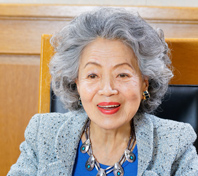
Momoyo Ise, First Executive Director of the United Nations University and President of the Association of Former International Civil Servants-Japan
Profile
Born in Tokyo and raised in Kyoto, Ise majored in sociology at the Department of Philosophy of the Faculty of Letters, Keio University. After graduating in 1959, she obtained a Master’s degree in sociology at Syracuse University and a Master’s degree in urban planning at Columbia University. After working at the United Nations Headquarters covering issues related to economic and social development, she was appointed the First Executive Director of the United Nations University (UNU). She then became Director of the Office of Human Resources Management at the UN. She also served as the Executive Director of the Asian Women’s Fund.
Ise was involved in the anti-poverty policies initiated by President Kennedy in the 1960s
─ You worked at the United Nations for many years, and also served as the first Executive Director of the United Nations University, of which the headquarters is located in Japan. First of all, please tell us how you got to work at the UN.
America in the 1960s was in the midst of promoting civil rights and eradicating poverty through Great Society policies that were launched by the Kennedy Administration and taken over by President Johnson. Back then, I was studying at Harvard University after obtaining a Master’s degree in sociology at Maxwell Graduate School of Syracuse University. That was when I received an offer to become a research director for anti-poverty programes in Syracuse, New York, in relation to the anti-poverty policies of the U.S. government. As you can see from the fact that they offered such a position to a young Asian female researcher, America in those days was full of motivation to establish a liberal society, and you could sense people’s excitement for change as well as their open-minded generosity.
After that, I was involved in the anti-poverty programs of New York City. I would cover all the deprived areas within the city such as Harlem and report to Washington, D.C. on how government subsidies were being used. There were occasional conflicts between white and black staff, but everyone was friendly to me probably because I was in a neutral position, not belonging to either group.
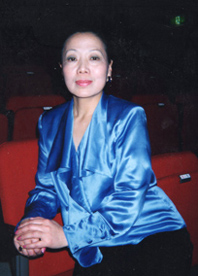
─ After that, you became an official staff of the UN, a so-called international civil servant.
There was an event that triggered my joining the UN. One day, there was an article in the New York Times, which asserted that an Israeli working as a computer specialist without U.S. citizenship should be considered illegal, and after that, the issue of foreign workers, especially specialists without U.S. citizenship, came to the fore. Although the U.S. is open to researchers, a person with foreign citizenship trying to work as a civil servant regular employee would draw criticism. In addition to this legal question, I realized my personal limitations as a Japanese working in the U.S. social issues. In this type of atmosphere, and thought it best to extend my abilities in an international field. So I went to the UN and applied for a position. As a result I was appointed as social development officer in the Department of Economic and Social Development.
─ In the UN, what kind of responsibilities did you have and how did you feel about working there?
My first job was to prepare reports on the social development of each Asian country. We would evaluate various social aspects such as education, disparities in society, poverty, race, and so on, but I would never actually visit those areas. An important role of the UN is to collect statistical data. I would check statistical data, analyze the economic and social trend ask numerous questions to each country to collect data, and would then compile the statistics and make a comprehensive evaluation for the report. Having studied statistics at Syracuse University helped me.
At the UN, you are assigned a job right away, and in addition, these jobs deal with major and fundamental issues affecting international and national policies. Although there are layers of checking mechanisms to ensure a high level quality of these analyses and conclusions, heavy responsibilities were put upon me.This hat make you wonder if it is really okay to handle it all on your own. However, In order to be a competent and effective officer at the United Nations, I think it is difficult to be good at your job with only a university degree. What UN needs is someone who actually has practical experience prior to entering the Organization. You need to have built your career, or even if you are in the process of building one, it is important to have your own opinion and be able to do your job properly. So people in the UN are in a way mavericks, and I was no exception. Although I worked at the UN, I avoid saying that I am employed by the UN, because for me working for the UN is not just a job but represents ways of life and one’s value system. Even after I left the UN, I continue to take interest in studying “society”. This aim hasn’t changed, and I have been involved in tackling various social issues such as those faced by women in Asia.
─ As a female did you experience any difficulties at your work?
As far as working in the UN, I never felt discriminated against. Back then, the status of women was low in most countries ,i.e., Member States of the UN around the world, but the UN itself was ahead of its time in that it had declared gender equality in its Charter. However, management level was male-dominated. Today, the male-female ratio is fifty-fifty, and I feel that the management level has also become gender equal.
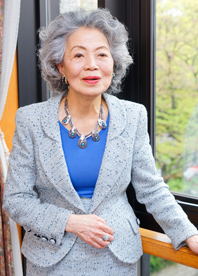
- You made some great achievements as the first Executive Director of the United Nations University.
The United Nations University, with its headquarters in Japan, was established based on the proposal of Secretary-General U Thant at the UN General Assembly. The project was initially headed by Mr. Yasushi Akashi, but since he took a position in was transferred to the Japanese Ministry of Foreign Affairs for a certain period, I was asked to took over his work in establishing the University. We first set up a preparatory office within the UN Headquarters in New York, and then an office in the Imperial Hotel in Japan to launch the university council, and in order to prepare a headquarters agreement, I participated in negotiations between the Legal Affairs Bureau of the UN and the Japanese government. The UNU was established in 1975.
The first rector of the UNU was Dr. James Hester. He used to be the President of New York University, and was called in for his ability to collect donations from the U.S. government, but I personally then felt that rather than a scholar, the head of the UNU should be a person like Ryotaro Shiba, who had a global vision, an acute sense of history, and dreams for the future.
A list of candidates which was prepared by the UN for the first rectorship was large and contained names of intellectuals and former presidents and prime ministers. Still, the first rector did a wonderful job. Although some changes have begun to be seen in academic institutions, in those days academic fields such as economics and sociology tend to be split vertically, Dr. Hester took an interdisciplinary approach so that research can be conducted based on themes such as hunger and economic development famine, natural resources, and social development. This was a remarkable accomplishment. He was able to make substantive teams headed by first class scholars in each of the field.
Soon after the UNU was established, the fact that there were no students nor professors sparked questions on why it was called a university. In reality, the UNU is more of a headquarters for research rather than a university, and coordinates more than ten UN research centers around the globe, such as the Institute for National Resources in Ghana, Africa, and the World Institute for Development Economics Research in Finland, to name a few. One of its original objectives was to provide opportunities for researchers in developing countries as they have few chances to be recognized on a global scale. This objective has been achieved also with the help of technology, and today, researchers from various countries participate actively and freely in research in every part of the world. Also, an academic degree program started from 2010, and now the university also operates has a graduate program.
─ After the UNU got on the right track, you went back to the UN Headquarters in New York, and as Director of the Office of Human Resources Management, you were involved in recruitment examinations and training. For students who want to work in international organizations such as the UN, what do they need to do while at university?
First of all, you should take an interest in and pay attention to what is happening in the world. I think that also in university, there should be opportunities to discuss current affairs on a daily basis. All kinds of aspects such as politics, economics, religion, and race are complexly intertwined in current issues. You need to view things multilaterally, listen to other people’s opinions, particularly of stakeholders and present your own opinion. Nothing is more useful as a study material than current affairs.
As for your question about how to find work in an international organization, to put it in the extreme, the UN does not need pure researchers. Instead, they need people who can make use of various research results and plan policies that can actually help people’s lives. To address this need, please take interest in what is going on in the world, acquire the habit of participating in discussions, and always have your own opinion.
I was a fourth-year member of I.I.R., where I developed the desire to study abroad
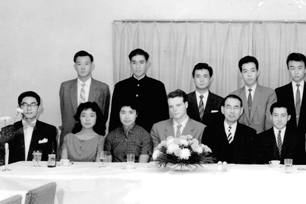
- Please tell us how you entered Keio University, and memories of your life at Keio.
In high school, I had already decided to major in sociology, and I wanted to go to a university in Tokyo. When I talked about it with my father, he said that it was all right only if I was going to study at Keio University. Other universities were not acceptable [laughs]. He had grown up at Keio, and he was a great admirer of former Keio President Shinzo Koizumi.
Back in those days, there were many cultured and sophisticated professors at Keio University, such as Prof. Yasaburo Ikeda of Japanese literature and Prof. Shintaro Okuno of Chinese literature. From Prof. Kizaemon Ariga who was my seminar professor, I learned about the family system, feudal society, and the system of commercial distribution, and he aroused my interest in sociology. The theme of my graduation thesis was the geisha society of Gion in Kyoto. The professor found my research rare and interesting, and although a lot of improvement was in order I got an A as well as the opportunity to present it at an academic conference on cultural anthropology in the U.S.
I liked English, and I used to belong to K.E.S.S. (Keio English Speaking Society), but later on, I shifted my activities to I.I.R. (Keio University Institute of International Relations). I.I.R. is a student organization for international students exchange, and we would send students overseas as well as welcome students from abroad. I joined the organization in its fourth year. Raising funds to receive international students was quite tough, and senior students would go to politicians as well as business establihsments and explain the purpose of international exchange to ask for their cooperation. We frequently held dance parties for fundraising. Prof. Eiichi Kiyooka, famous for his translation of Fukuo Jiden (“The Autobiography of Fukuzawa Yukichi”), was very supportive. He was warm and gentlemanly, and he helped us in various ways. Without his presence and support, it might not have been possible for IIR to actively exist and celebrate 60th anniversary.
It was an exciting experience showing students from partner institutions, such as Stanford University and the University of British Columbia, around Tokyo and having discussions with them on various topics. Through these activities, my desire to study abroad developed, and after graduation, I went to university in the U.S.
Today, activities of the I.I.R. have expanded, and they send many Keio University students overseas as well as deepen mutual understanding with international students whom they invite to Japan.
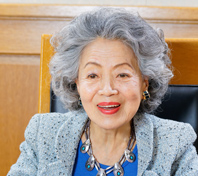
- You talked about paying attention to current affairs, participating in discussions, and having your own opinions, but do you have any other messages for current Keio University students?
Since I was born during World War II, I, as a child, witnessed violence against the community people by those who were given authority by the Japan’s military regime. I, therefore, was deeply relieved when the war ended, and through agrarian land reform and dissolution of the zaibatsu (company syndicates) that brought social reform, I could strongly sense that the Japanese people became more equal and united. I also felt truly happy about our new constitution. In short, I saw a bright future then. Now, when we look at Japan and its future, the Cabinet Office estimates that the population in 2060 will be 87 million, which is about two-thirds of the population today. What I truly ask for Keio University students who must bear such a future is to not become inward-looking. Unlike the times when advanced countries such as the G5 or G7 directed the world, now it is the era of the G20.meaning that a number of players is increasing encompassing different views, values, and ideas. I think it is really important for Japan and also for each one of you, young people to look head-on at the ever-changing world and to be connected in a stronger and deeper way.
- Thank you very much.
*Position titles, etc., are those at the time of publishing.
